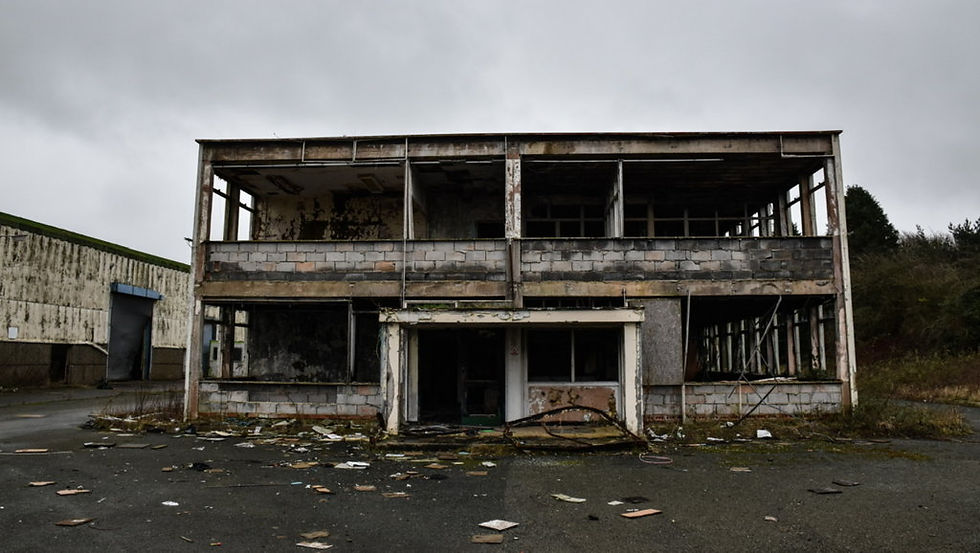Visit Caernarfon: The History of Ferodo Factory in Caernarfon
- Michael James
- Sep 26, 2023
- 3 min read

Introduction
The Ferodo Factory in Caernarfon holds a rich history, from its establishment to its current state of disrepair. This article explores the fascinating journey of this iconic automotive group and its significant role in the region. We will delve into the factory's inception, its involvement in the automotive industry, and the challenges it faced throughout the years. Join us as we uncover the story behind the Ferodo Factory in Caernarfon.
The History of Ferodo Factory in Caernarfon
Early Years: Inception and Growth
The Ferodo Factory was founded in Caernarfon in 1962, with the prestigious honor of being opened by Princess Margaret herself. Initially, the factory served as a crucial hub for the production of automotive components, particularly brake pads and linings. Ferodo quickly gained recognition for its high-quality products, which were in high demand within the growing automotive industry.
With the factory's success, Ferodo became synonymous with innovation and reliability in the automotive sector. Its commitment to excellence propelled the brand forward, and the factory expanded its operations to meet the increasing market demand. The workforce grew, and the factory became a vital source of employment for the local community.

The Friction Dynamics Strike
However, the Ferodo Factory faced a significant setback in April 2001 when a lengthy industrial strike by the Transport and General Workers Union members of Friction Dynamics began. The strike lasted for an astonishing two and a half years, causing immense disruption to the factory's operations. This period was marked by tension and conflict, as both sides battled for their respective demands.
The strike garnered widespread attention and became a symbol of labor disputes in the United Kingdom. It had a profound impact on the factory and its employees, with the effects rippling throughout the local community. Despite efforts to resolve the conflict, the strike continued until its eventual resolution, marking a challenging chapter in the Ferodo Factory's history.
Change in Ownership and Decline
Following the strike, the Ferodo Factory underwent a change in ownership. Bluefield Caernarfon Ltd acquired the site in 2007/08, with plans for redevelopment and revitalization. However, these plans did not come to fruition, and the factory's buildings gradually fell into disrepair. Vandals and arsonists targeted the abandoned site, exacerbating its deterioration.
One of the significant challenges faced by the new owners was the presence of asbestos within the factory. The cost of asbestos removal and site clearance proved to be a significant hurdle, with estimates reaching millions of pounds. This further hindered any potential redevelopment efforts, leaving the factory in a state of neglect and abandonment.
Proposed Redevelopment and Future Plans
In recent years, discussions have emerged regarding the future of the Ferodo Factory. The site, located near the Menai Strait, was identified as a potential location for a multi-million pound North Wales prison. This development would have created numerous job opportunities and breathed new life into the area. However, specific plans and timelines for this proposed redevelopment where rejected.
Additionally, there have been talks of transforming the site into a digital center for North Wales. This ambitious vision aimed to leverage the factory's existing infrastructure and re-purpose it for the digital age. Such a project could have had a trans-formative impact on the local economy, attracting businesses and fostering innovation in the region.

The Legacy of Ferodo Factory
Despite its current state of disrepair, the Ferodo Factory in Caernarfon holds a significant place in the region's history and serves as a reminder of the industrial heritage of the area. The factory's prominence within the automotive industry and its contribution to the local economy should not be forgotten.
Efforts to preserve and revive the Ferodo Factory have gained attention from various stakeholders, including heritage organizations and local authorities. These groups recognize the historical and cultural value of the site and advocate for its restoration to ensure its legacy endures for future generations.
Conclusion
The Ferodo Factory in Caernarfon has experienced a remarkable journey, from its establishment as a leading automotive component producer to its current state of dilapidation. The factory's history is marked by moments of triumph and challenging periods, including the Friction Dynamics strike and subsequent decline.
While the future of the Ferodo Factory remains uncertain, there is hope for its revitalization and transformation into a hub for innovation and growth. The legacy of the factory and its impact on the local community serve as a testament to the resilience and ingenuity of the people of Caernarfon.
Through preservation efforts and strategic redevelopment plans, the Ferodo Factory holds the potential to once again become a thriving center of industry and a symbol of the region's industrial heritage. As we move forward, let us remember the rich history of the Ferodo Factory in Caernarfon and the lessons it teaches us about the ever-changing dynamics of the automotive industry and the importance of preserving our industrial past.

Published by
Visit Caernarfon Ltd.




